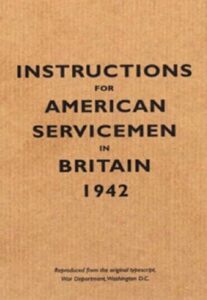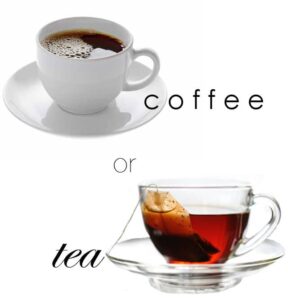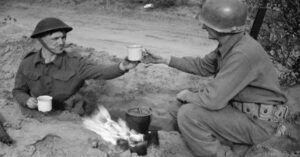
 In every branch of service, and every war, the US servicemen are given a handbook. The book is filled with useful information, meant to make the transition from civilian to soldier a successful one, even if it is not an easy one. No young civilian preparing to go to war really has a good idea of what they are getting into. I suppose more of them do these days, than their World War and prior wars era counterparts. Nevertheless, each of them is proceeding head on into a massive reality check. The handbook can be a sobering little book, especially when the new soldier reads the chapter that recommends the writing of a will. The need for a Last Will and Testament will become crystal clear when the soldier sees his (or her) first battle. The sight of dead bodies takes away any misconception the soldier might have of their own mortality, and the possibility that they may have been given a one-way ticket to this battle.
In every branch of service, and every war, the US servicemen are given a handbook. The book is filled with useful information, meant to make the transition from civilian to soldier a successful one, even if it is not an easy one. No young civilian preparing to go to war really has a good idea of what they are getting into. I suppose more of them do these days, than their World War and prior wars era counterparts. Nevertheless, each of them is proceeding head on into a massive reality check. The handbook can be a sobering little book, especially when the new soldier reads the chapter that recommends the writing of a will. The need for a Last Will and Testament will become crystal clear when the soldier sees his (or her) first battle. The sight of dead bodies takes away any misconception the soldier might have of their own mortality, and the possibility that they may have been given a one-way ticket to this battle.
While many of the things contained in the handbook are sobering and even quite scary for the soldiers, there are some things contained therein that have a much more practical usage, and a few that looking back, anyway, are just a little bit funny. One such tidbit contained in the US servicemen’s World War II handbook was the simple statement that, “The British don’t know how to make a good cup of coffee. You don’t know how to make a good cup of tea—it’s an even swap.” I suppose that statement is true, at least as it pertains to the fact that British “bad coffee” is an even swap with US “bad tea.” I don’t think they US government was trying to “bad-mouth” the Brits, but rather that they were simply stating a fact. If the men were in a British camp, they simply shouldn’t ask for a cup of coffee, because they would be sorely disappointed in what they were served.
Like the warning labels of items these days, like not to shower with a running blow dryer, or to shut off the engine before trying to remove the fan belt on your car, the point was to make the reader aware of the ramifications of making such bad choices. Still, some “warnings” make more sense than others…or do they? While the electricity problem of the wet running blow dryer and the finger removal outcome of putting one’s  hand out to touch a fast-moving fan belt, seem like rather stupid wisdom (is there is such a phrase), the idea that a person would automatically make a bad cup of coffee, simply because they are British, seems equally ridiculous. Nevertheless, the US servicemen were warned to expect “bad coffee” from the British, so that they were prepared to either drink tea with the Brits, or swallow down the offending coffee so as not to offend the Brits. I’m sure that much of the rest of the handbook contained valuable information, but it is possible that the most valuable information contained in the World War II US servicemen’s handbook, was intended to avoid the notion that the Brit might have poisoned them with the British coffee.
hand out to touch a fast-moving fan belt, seem like rather stupid wisdom (is there is such a phrase), the idea that a person would automatically make a bad cup of coffee, simply because they are British, seems equally ridiculous. Nevertheless, the US servicemen were warned to expect “bad coffee” from the British, so that they were prepared to either drink tea with the Brits, or swallow down the offending coffee so as not to offend the Brits. I’m sure that much of the rest of the handbook contained valuable information, but it is possible that the most valuable information contained in the World War II US servicemen’s handbook, was intended to avoid the notion that the Brit might have poisoned them with the British coffee.


Leave a Reply